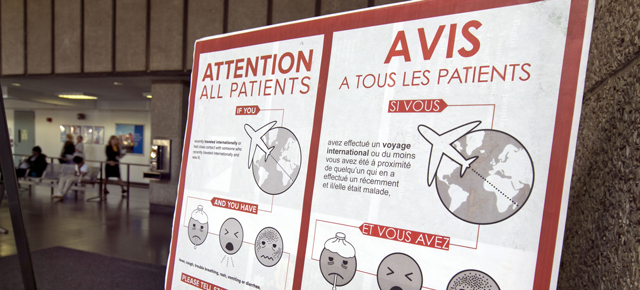Along with shoe X-rays and toiletries in ziploc bags, we can now welcome fever checks as the latest addition to airport security theatre. Today, US officials announced they will screen passengers coming to five major airports from the African countries hit worst by Ebola — despite no real evidence that it will make us safer.
To be clear, this does NOT mean airport screening won’t do a damn thing, panic. It’s more like airport screening won’t do a damn thing and there is no reason to panic about Ebola in the first place.
Non-contact infrared thermometers will be used to take the temperature of passengers coming from Liberia, Sierre Leone and Guinea to five major airports: JFK, Newark, Dulles, O’Hare and Hartsfield-Jackson. Ninety per cent of the passengers from those countries arrive at one of these five airports.
But to understand why screening for fever, an early symptom for Ebola (and many, many other non-deadly diseases you are surely familiar with), is a waste of time and resources, you just have to understand how the Ebola virus works.
It won’t catch everyone with Ebola
“The big issue is that fever is a very insensitive marker,” says Amesh Adalja, a public health expert University of Pittsburgh Medical Center. You don’t need to look much further for proof of that than Thomas Eric Duncan, the patient in Dallas who died from Ebola today. When left Liberia, he had his temperature taken by a someone trained by the CDC with thermometer approved by the FDA. He didn’t have a fever. The screening wouldn’t have worked.
That’s because Ebola can incubate in the human body for up to 21 days before symptoms appear. And until those symptoms appear, Ebola is actually not contagious. And even then, it is only contagious through direct contact with bodily fluids, making it a lot harder to spread than the common airborne flu.
Sure, there is may be some a psychological assurance to the public that officials are doing something to keep Ebola out. (On the other hand, unnecessary screenings arguably cause people to freak out, too.) But when Ebola cases slip through the screening undetected — as initially asymptotic cases surely will — that can backfire and erode public trust, too.
It will catch a lot of people without Ebola
There are so many reasons why someone could have a fever that have absolutely nothing to do with Ebola — the flu, for an exceedingly common example.
During the SARS outbreak in 2003. countries including Australia, Canada, and Singapore put fever screening programs in place. Hundreds of passengers were found to have elevated temperatures but few, if any, actual SARS patients were caught in those screening. Meanwhile, some passengers were quarantined for as long as a week.
So what’s the harm a little extra precaution? It’s more than just inconvenience for a few people. It takes considerable resources to screen and quarantine potentially sick passengers — resources arguably better spent fighting the Ebola outbreak where it’s clustered. “Really what we need to ramp up basic public health in Africa,” says Dr. Adalja. Until the outbreak in West Africa is contained, there will always be the danger of isolated cases making it over.
And there are lots other loopholes
Whether deceitfully or not, it’s not hard for someone carrying Ebola to slip past the screening. A passenger might stop by in, say, Europe for a few days and book a separate flight to the US. Or they might book a flight to an airport not on the screening list, which doesn’t encompass all passengers coming from the three west African countries. Or they can downright game the system by taking Tylenol to lower their body temperature just before landing.
It’s hard to implement a perfect airport screening system, but even a perfect airport screening wouldn’t be necessary. The chances of Ebola spreading in the U.S. with its first world healthcare infrastructure are already so low.
In the end, the screening program may alert people with actual reasons to worry about Ebola to be vigilant in seeking healthcare. But it’s also a mostly unnecessary measure that trumps up the actual danger of Ebola in the U.S. That’s the irony underlying security theatre — its appearance may be meant to allay our concerns, but it’s actually reminding us of what we have to fear, even when it’s misguided.
Picture: A sign posted in the lobby of New York’s Bellevue Hospital. AP Photo/Richard Drew
